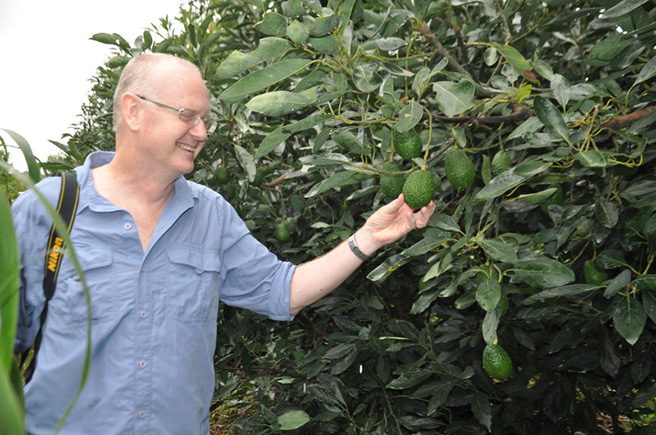kick-off of the Rural Entrepreneurs Network Tanzania
(RENTC) information network that has seen the
distribution of market information to subscribers. SAMPLE OF HASS AVOCADOS
 disseminated to smallholders as part of a new
disseminated to smallholders as part of a new Tanzanian market information system by TAHA.
In the last quarter USAID-TAPP made commendable
strides towards reaching our goal of achieving food
security by boosting agricultural productivity for food
consumption and income generation. USAID-TAPP
agronomists conducted over 300 technical advisory
visits to farmer groups and processors, where 8,997
beneficiaries were trained, 51 farmer groups were
strengthened, and 8 new partner organizations are now
providing improved extension services to smallholders.
In addition, peer educators trained 2,910 people in
HIV/AIDS awareness and prevention, including 741
youths.
USAID-TAPP aims at helping small farmers improve
agricultural practices, productivity and market share.
The goal is to increase rural incomes and transform
Tanzania’s agriculture sector. Happy New Year!
Jim Vernon, Program Director
Tanzania Agriculture Productivity Program
TOMATO WORKSHOP IN ARUSHA
USAID-TAPP facilitated a tomato workshop at the New
Arusha hotel. The meeting brought together over 107
tomato growers from the tomato growing regions of
Arusha, Kilimanjaro, Morogoro and Lushoto. It was an
opportunity for tomato farmers, seed companies,
researchers, and processors to meet, exchange ideas,
and foster good working relationships with an aim of
strengthening the sector. Darsh Industries are a major
buyer of tomatoes in the country and have seen a
significant increase in orders due to their superior
product lines. As a result, Darsh Industires has
undertaken an initiative to source more fruit and
vegetables from local producers to meet the increased
demand. At the workshop farmers were also sensitized
on the use of good seeds as well as market standards
on varieties and quality of tomatoes needed for
processing.
The workshop enabled USAID-TAPP the chance to
train farmers on tomato production and marketing skills,
and provided a forum where challenges and
“Increased food security through enhanced
productivity”
TAPP is a 5-year program designed to increase smallholder
farmer incomes through enhanced productivity, crop
diversification and improved market access.
Visit
www.tanzania-agric.org
for more information on upcoming
activities and to receive copies of monthly bulletins and
success stories.
P.O. Box 15035 | Arusha, Tanzania
Tel: 255 (0) 27 2549325
tapp@fintrac.com
TAPP staff overlook rows of Trees
with our new partners at Africado Ltd.
